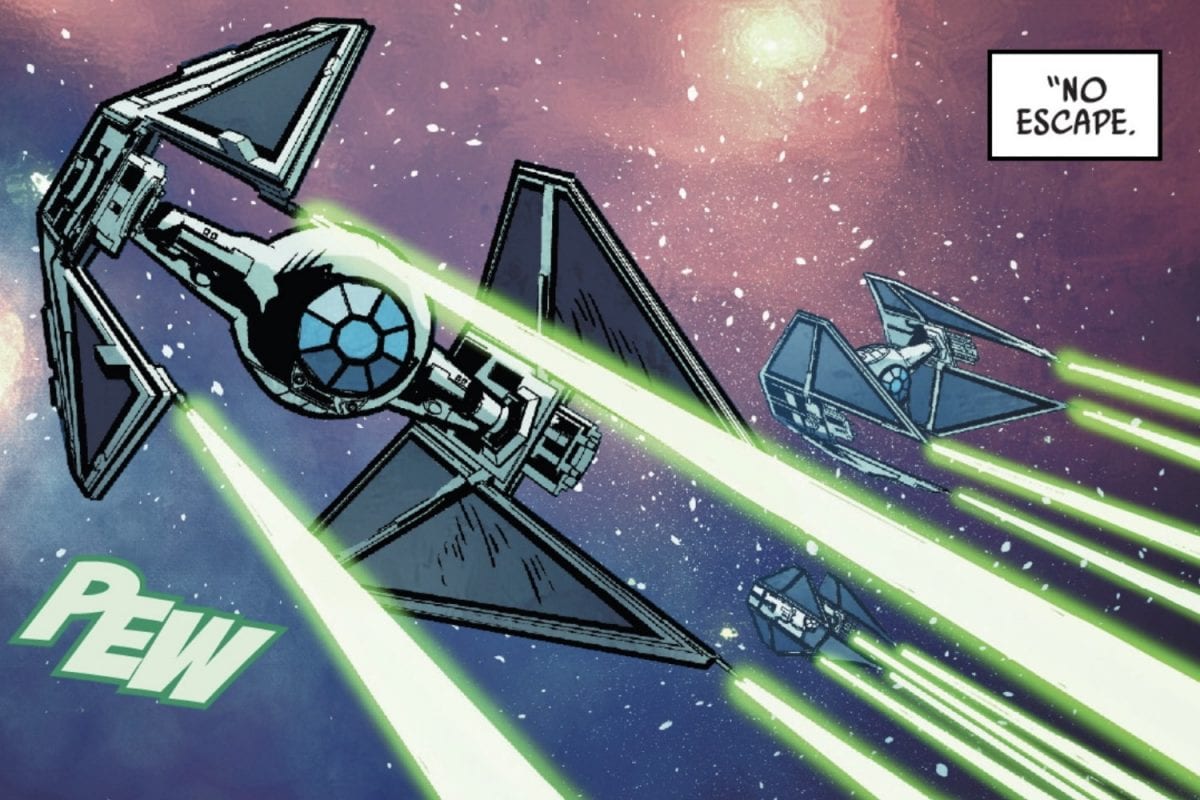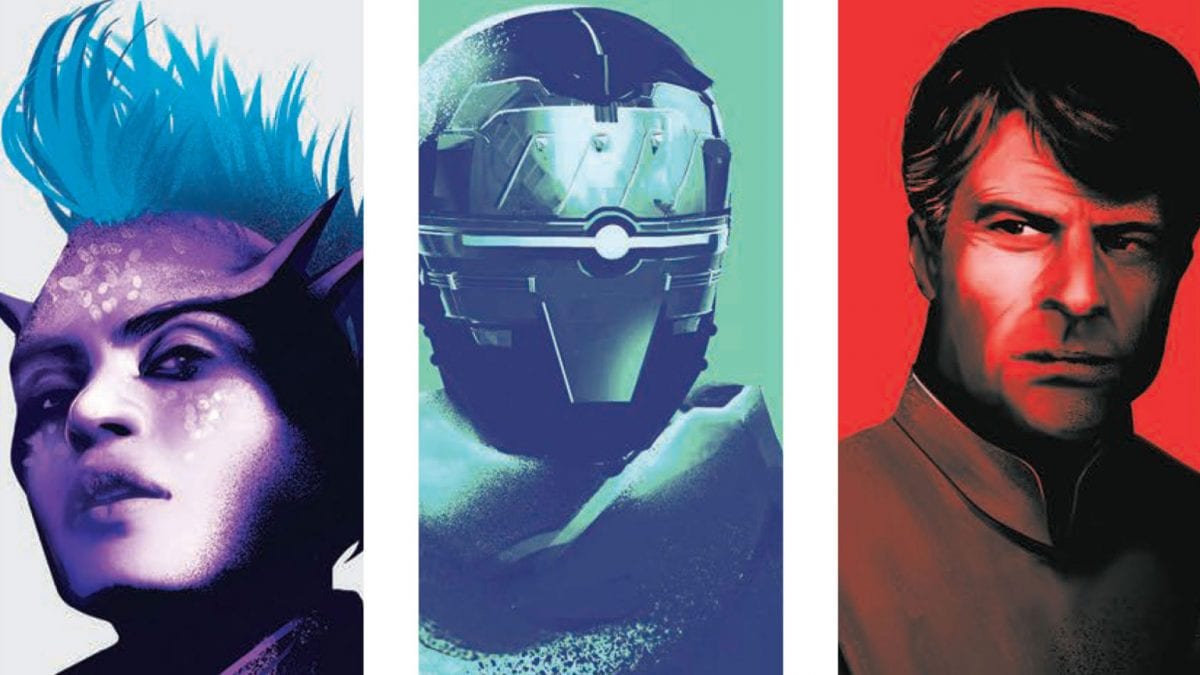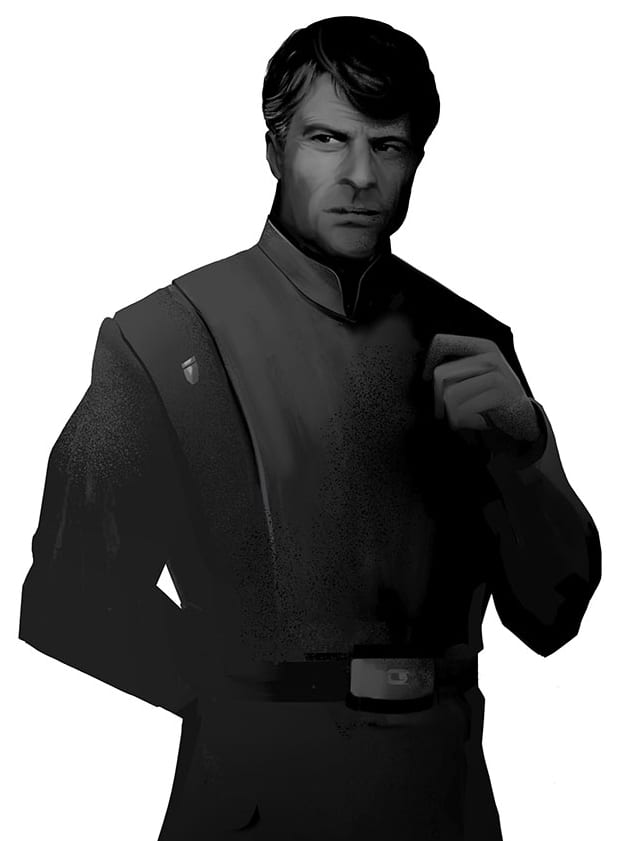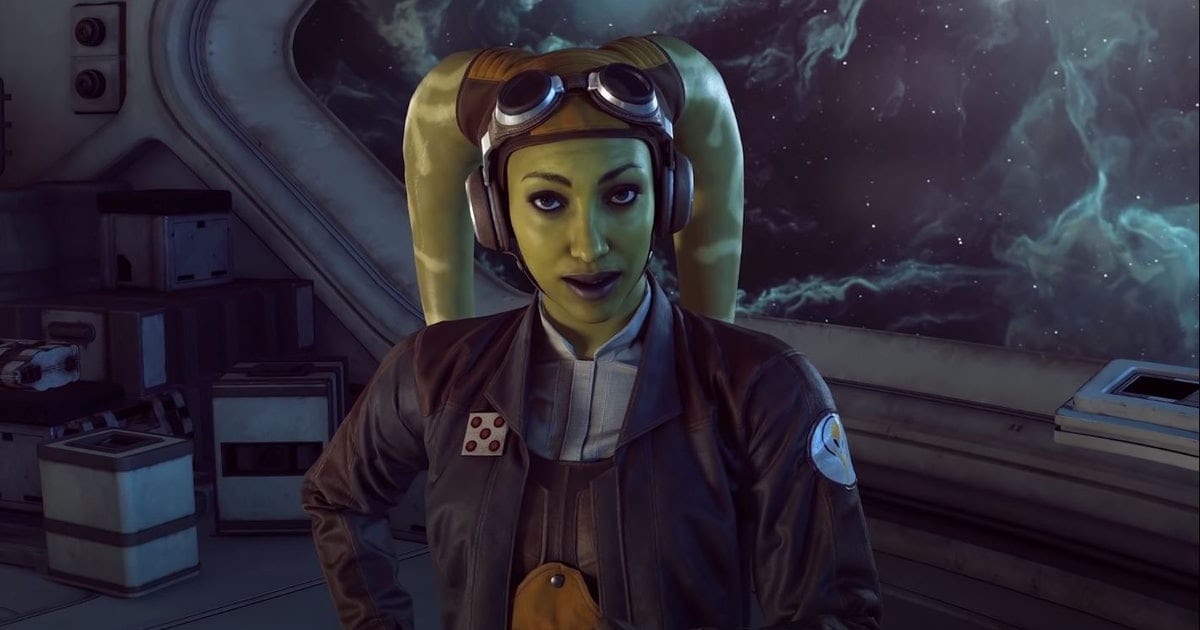Alexander Freed completes his Alphabet Squadron trilogy with the stunning Star Wars: Victory’s Price, a thrilling conclusion to this series where the New Republic is on the brink of victory over the elusive Shadow Wing and the remaining Imperial fleet. In this winner take all final showdown on the planet of Jakku, those left standing will determine the state of the galaxy for years to come.
(que Tom Kane)
Last time, on Alphabet Squadron…
After the tragic events in the Cerberon system and spurred on by the fact that her friends learned the truth about her past, Yrica Quell has left the New Republic fleet to reunite with Colonel Soran Keize and the 204th Imperial Fighter Wing.
With a void now in the leadership position and after his heroics on Troithe, General Hera Syndulla has promoted A-Wing pilot Wyl Lark to squad leader in her stead. But with limited resources he’s not only in charge of Alphabet Squadron, but Hail, Flare, and Wild Squadron as well.
For his part, Nath Tensent has chosen to see this thing through and while his relationship with Wyl is strained, it hasn’t broken, and he remains steadfast in his protection of Wyl. But, while he enjoys the “hero” worship of his comrades, Nath is beginning to question what life after the war will look like for a pirate.
Chass na Chadic, presumed dead in empty space, was rescued by the Children of the Empty Sun and spent some time at their temple on Catadra. With a new sense of purpose (and confusion), she returned to the fleet but has taken to praying and listening to lectures by their dodgy leader, Let’ij.
As for Kairos, she remains as enigmatic as ever, but after suffering horrific injuries on Troithe, the mystery behind who she is, where she comes from, and what her motivations are is beginning to take shape…
Endings are hard, just ask J.J. Abrams, especially ones with many moving pieces, high to catastrophically high stakes, and a large main cast, all who must be accounted for since this story begins and ends, in media res. Considering canon only and removing The High Republic, there’s almost as much Star Wars that comes after Alphabet Squadron, as does before it. So, not only does Alexander have to squeeze this trilogy into a very delicate part of the timeline, but it must be precise, it must be entertaining, and it must be accountable.
So, how did Mr. Freed do?
I made it known even before reading Victory’s Price that this trilogy is my favorite of all time, including the EU. The first two books are achievements in Star Wars storytelling as far as I’m concerned, with Shadow Fall in particular expanding our purview of what a Star Wars book can accomplish.
I’m happy to say that not only did Victory’s Price reinforce my position, but it’s also made me even more bold when it comes to stating it. So, to answer the question, yes, Alex stuck the landing. How he did that and what takes place is what we’ll discuss.
I’ve tried to make this as spoiler-free as possible, which it mostly is, but the odd minor detail may have slipped out so, consider this your spoiler warning!
The greatest compliment I can give Alex is that he somehow writes Star Wars without it feeling contrived in any way. You could replace every single Star Wars axiom and bit of vernacular and it would still be a great story. He’s one of only a few who I think accomplishes this on the reg, Claudia Gray being another that springs to mind. Strong, tactile character work is at the heart of both, grounding stories with emotionally relatable underpinnings.
And think about that for a second, how difficult a proposition that is over the course of three somewhat lengthy books in a portion of the timeline that is bookended by huge projects. It’s hard, very hard in fact, just ask the series’ editor Elizabeth Schaefer.
One thing Star Wars publishing in the Canon era hasn’t been able to do, is avoid clichés. The concepts they’ve executed have been in lockstep with their strategy, which makes sense after all, why else would you conceive of a plan you had no desire to implement. So, while having a story group certainly is a great thing for continuity, it doesn’t always incite inventiveness.
Apologies to the Blue Crew™, but how many Thrawn books are there now? And while I think The High Republic is off to a great start, it is undoubtedly very “Star Wars”. And yes, I see the importance of creating stories that follow the brand, but what we all crave after 40+ years I think, are stories that build upon and expand that galaxy far, far away, not rehash it.
What Alex has done here, is go beyond simple battles of good versus evil, of light versus dark. More than almost any other, what he’s offering is a decisively more morally complex view of the not only the universe, but also the people who occupy it. And in doing so, has created a majestically nuanced version of Star Wars that is more textured, complicated, beautiful, violent, and rich than before. And he did it without using superlatives or ideas and concepts that have been laundered to death. I really think this is as original a Star Wars story as you’re likely to get nowadays in that part of the timeline.
Part of Alex’s motivation I believe, and I’ll ask him, is that he wants you to take Star Wars seriously. This is not to say he doesn’t have a sense of humor, the books have moments of levity and plot derivative knee slappers, but after only one chapter you can see our cast is dealing with some pretty serious shit. I mean, even the chapter titles are critical and compulsive, and Alex is right not to ignore the ugly truth of war and the toll it takes on those involved.
Having said all of that, mapping out a trilogy for an IP that has been around since 1977 has many advantages, one of which is you don’t really have to do any worldbuilding. And in no way diminishing his effort, he has the added benefit of being inspired by those that came before him and acknowledges as much in the author’s notes. There he thanks Michael A. Stackpole and Aaron Allston, architects of the original X-Wing novels that influenced many but have since been relegated to the Legends category. Tip of the cap to those chaps.
Okay, let’s get to the good stuff!
If the galaxy was vengeful last time, now, it’s just tired. Tired of war, tired of Jedi, tired of Sith, just…tired. And this lethargy has absolutely infected those on both sides of this war, which for many, has gone on far too long, and the price has been way too high. Folks, we reached a pound of flesh a long time ago and as the great General Organa once said, “too many losses.”
This dire place is where Victory’s Price begins!
“Only rebellions thrive on hope. Republics need sturdier foundations.”
As the victory at Endor becomes an even more distant memory, and with the scattered Empire in further disarray, a New Republic Victory seems imminent but not guaranteed. And this New Republic, still led by Mon Mothma, has the difficult task of both mopping up and transitioning to power. Coming as no surprise to anyone, finishing off an opponent can be the hardest part of victory, especially one that’s had its claws sunken in so deep, for so long.
I very much appreciate how Mothma at this stage is looking to harvest that last bit of innocence and use it sow the seeds of freedom and convince billions of people that the New Republic will be an upgrade. She’s surrounded by those who think once the material part of the war is over the galaxy will fall into place, but she knows better, and so do the people she relies on most, like Gail Ackbar and Hera Syndulla. And what we’re getting here, is not only hints at what a post-Imperial galaxy might look like, but that it’s not a rosy outlook for literally billions of lives, or so Colonel Soran Keize believes.
Yes, the 204th Imperial Fighter Wing is still a nuisance, and yes Keize is as handsome and wonderful as ever. And now, with Yrica Quell back as his co-chair, the whole group feels a little surge of adrenaline. But rather than swim some laps or hit the treadmill, they’ve enacted Operation Cinder: Part Deux instead. This rehashing of one of Emperor Palpatine’s most vicious mandates has also lit a fire under the pants of Syndulla and her squad of Shadow Wing stoppers, who understand that a repeat of Nacronis is in nobody’s best interest.
The chase is on, again.
This second round of cat and mouse goes on for a bit and then culminates with a three-way third act not unlike Return of the Jedi, with action taking place on the Deliverance, Jakku, and Coruscant simultaneously. This final act of aggression in the war we learn was really the last-ditch effort for both sides, having committed most of, if not all their resources to Jakku, winner taking all.
I’m going to let you discover the second act mostly for yourself but understand that the composition of this story is predicated on the simple idea that Alex doesn’t machinate fluff. It’s dense, it’s complicated, and it’s essential, if you’ve bled along with these characters, that you see this to the end. But know that there’s an entire side mission involving Chass and Kairos, that from start to finish, will leave many readers in awe of his skill as a storyteller, especially on a cinematic level.
All I’ll say about that is this mission has one of my favorite sequences from all three books, where they pay a visit to the Netalych system, in particular an ex-Imperial outpost called DN-949A. What’s unique about this outpost is that just after the Battle of Endor, the local Imperials were overthrown by droids, who outnumbered them 3 to 1, and who have since claimed independence.
I won’t reveal the purpose of their visit or the outpost’s significance, that would be saying too much. But, if you’re like me and love droids, in particular machine level sentience and learning, especially the philosophical side of this issue, you’ll be in absolute heaven. The dialogue and ideas presented is very noteworthy here and I know from speaking to Alex a few times before, this was pure joy for him.
As I said for Shadow Fall, Alex’s writing has a Sapir-Whorf theory effect, where language can alter the way your brain processes information. And like that second act, this one keeps you mostly off balance as the power of words and imagination take hold revealing not only vital plot information but key character bombshells. Where that book was more cerebral in its methodology however, Victory’s Price espouses a more epistemological flavor, studying our relationship with the very nature, origin, and limits of knowledge. And using the main branches of philosophy, Alex takes certain characters on a bit of a metaphysical expedition if you will, altering their mindset on certain things.
But this is a story with a ton of structure and as such, requires balance, it requires bad guys, and it also needs a hook, and that’s where the Messenger comes into play. Yes, there’s a MacGuffin to this book which involves that werido who plays a key role in this part of the narrative but mums the word on that bit of hookiness. Let’s put it this way, their function and purpose are no longer for private eyes and is at last revealed. This revelation and the fruit that it bears solves two big problems for Alex.
One, it provides enough moral ambiguity when it comes to both Yrica and Koran’s reasons for their actions in the end, and two, it reinforces the underpinnings that the lines between good and evil are steadily blurred in a galaxy that thrives on blurriness. It also reminds us, above all else, in war, there are no winners despite what some people will tell you.
“…for it is the soldier who must suffer and bear the deepest wounds and scars of war.”
So much of what happened in Shadow Fall hangs over a lot of what happens in this book and provides each member of Alphabet Squadron a certain amount of resolution. But, keep in mind, there’s no storybook ending for this lot, not even surviving would necessarily provide a life that offers reprieve from seething content with hopelessness.
And this living for something notion is what the Alphabets, to the person, struggle with up until the very last page. Because they are all so messed up after years of fighting, it seems unlikely that even if they do survive, they won’t ever find peace. Such are the invisible scars those who have fought in war must wear, and the hidden wounds they must bear.
Speaking of struggling and as it turns out, Soran Keize ends up being one my favorite characters from this whole thing and whose motivations are surprisingly lucid for a madman. He acknowledged ages ago that the Empire was running out of time and that what’s driving him truly, is an honorable discharge or sorts for his immediate comrades. The trial of Fara Yadeez, former acting Governor of Troithe, and Quell’s hesitant assertion that no one is guaranteed a fair trial, provided the endorsement he needed to see his plan through.
So, when the 204th is called to Jakku for one last stand, and the Imperial forces fight over what is essentially a false idea of power, he goes off on his own. And so, as the trilogy started, so it ends with Soran and Yrica together, two individuals who seem at odds with the whims of the universe and the sides they’ve chosen. Hard not to imagine how they would’ve prospered if they only had been born into in a peaceful society built on the fundamentals of science and goodwill, you know, instead of this maelstrom.
It’s of course poetic for Alex to have these two at the end of all things, challenging each other in ways no other person could. Yes, theirs’ is about as intimate a relationship as you can get, and it’s an ugly type of beautiful.
As for Yrica, who let’s face it, is the star of the series and a remarkable character creation, even in today’s market, needs a day off. Her violence towards the Empire post-Nacronis used to pass for an apology, but that well ran dry and stopped medicating her post-traumatic stress many moons ago. Coupled with the fact that her mind and body have been broken and rebuilt so many times she’s lost count, and after the events in Shadow Fall, she’s a person in desperate need of some fortuity.
This blessing came in the form of a vessel, “silver and fluid like poured mercury, its interior lit like the chambers of a human heart, built with technology more sophisticated than anything the Empire fielded for ordinary military operations.” Yes, this forgotten ship on a forgotten planetoid, that once meant something to the Emperor, would facilitate the do over she so desperately needed. And for the first time in a long time, maybe ever, she’s resolute in her purpose.
This path she chooses and the redemption she craves in order to live a life worth living, post-war, comes to a head in the strangest of moments, from the strangest of people. It’s a fantastic bit of writing and provides a perfect ending for her.
Wyl Lark, our sweet baby boy, just wants to go home. Short of taking his A-Wing and running away, he does what he thinks is the next best thing, he grounds himself. But not before an incredible display or fortitude, bravery, and leadership which, quite frankly, kept the squadron together probably longer than it should have been.
You see, even at a young age, he’s seen enough war, enough death, enough destruction, but what does this system want from him if not to be a war hero? In that regard he’s no different than anyone else who’s sick and tired of this never-ending devastation. But, when he finds out from the Polyneus elders that he is the last of the 120 warriors sent from his home world to return, well, self-preservation kicks in.
Wyl represents the best of them, the best of us, the best anyone could aspire to be. And if the New Republic stands a chance of cleansing the galaxy of the Empire’s filth, it’ll need more Wyl Larks, not less. Victory’s Price is the best version of Wyl we’ve seen in the series and while he’s not my favorite Alphabet, he’s responsible for some of my favorite moments.
As you know already Wyl is on the cover, he earned it.
Speaking of tired but resilient, General Hera Syndulla (still horrifically underappreciated in Star Wars in my opinion) is just about spent. She’s lost count of the number of wins and losses and as we see in this book has one eye on the future, not least of which is being reunited with her son Jacen. But Hera still believes in democracy, in the New Republic, and in winning this war, she just wants it done sooner than later. But ever the fighter, she is who she and still walks with an open heart and courage spoken loud enough for everyone to hear.
So much of this trilogy has been about Keize’s desire to one up the famous Hera Syndulla, trying to outthink, outmaneuver, and outflank her every step of the way. Two brilliant tacticians always make for entertaining battles, but like always, it’s the intangibles that decide the victor, the ebbs and flow of wars that are won and loss in the margins. This is where Hera excels as a warrior and as a leader. And while a victory is never fully assured, just know that General Hera Syndulla will always find a way.
And apologies to Johnathon Jackson Miller and all the writers of Star Wars Rebels, but this is the best Hera has been in any medium, period. Check out this third act if you don’t believe me. Oh, and keep an eye out for a quick but important bit of information that may be hinting at Hera resuming a search for a certain someone.
Nath, frankly, is ready to move on, especially as those bureaucratic control mechanisms start to emerge. He doesn’t like following orders regardless of which side he’s on, so the whole thing is worn thin. If it wasn’t for his unofficial oath to protect Wyl to the end, he probably would’ve been gone after Troithe. Heck, he probably should’ve left after his benefactor, Caern Adan died. But, since Wyl’s determined to see this thing to the end, so must Nath, he’s turned into that type of guy.
You see, for people like Nath who prefer the pirate’s life, when onset inflexibility kicks in, it’s time to move on, or in his case, perhaps back. But, while the pull to the pirate’s life may be strong, Nath is not without his scruples and is not about to let anyone down, not yet anyways, and one of those people includes Chass na Chadic.
As for Chass, she’s wishing so hard to forget that she’s alive but doesn’t seem to desire death anymore either. Whatever suicide pact she made with herself, has been temporarily reprieved so she’s left with only one clear choice, find a reason to live. And in Shadow Fall we saw the allure of what blind faith has to offer, and the ramblings of Let’ij and the Children of the Empty Sun might just provide the solace she needs.
Often, when people turn to religion, it’s because they feel a lack of purpose, of self-worth, and what’s more important than that? Chass, if not a warrior goddess, is what then? So, like the others, as the war threatens to end, she’s also wondering what will come of her after all is said and done.
These charlatans though don’t provide answers, they offer indifference, and that’s opposite of who and what Chass is. If she knows anything at all, its that it’s better to feel anger than nothing. Lucky for her there’s plenty of that to go around, still feeling the sting of Yrica’s betrayal back in Shadow Fall. In fact, you could say she’s obsessed with it, and when the opportunity comes to confront this head on, she takes it, and this a big part of that second act I mentioned that is lights out good.
Chass will always wear the invisible scars of war on her sleeve, it’s just who she is. But it’s what coping mechanisms she can track down in the end that will provide her a type of life she’s never known. Next to Soran and Yrica, Chass has my favorite ending of this series.
Speaking of endings, I’m going to say very little about Kairos who’s had the biggest impact on me personally, and whose resolution I was the most desperate for. If you remember when we last her, after being gravely injured, Caern Adan gave permission to remove her swaddle and mask in order to save her life, in turn, giving the squad their most revealing look at her yet.
They of course couldn’t have known this at the time, but by stripping away her outer layer, they also stripped away much, much more. Her resolve now, like her hands, isn’t as steady as it used to be, and she doesn’t hold on to her bowcaster as tight. This monster-murder-machine isn’t quite so effective but as you’ll see, has maybe the biggest role to play in the third act.
But, in keeping with her character, always with Kairos it’s something not wholly tangible, at least not something the others can see, and since she isn’t spilling the beans to just anyone, she remains enigmatic. For her, the battle isn’t just physical change, its her reconciliation with it, and that’s something only she can face. A journey more profound than the others, her shadows are waiting for an answer and each step she takes goes beyond this time and place. It sounds like gobbly goop, but you’ll get what I mean when you read the book.
By the end you understand that we’ll likely never know the entirety of Kairos’ story, but you’ll be more than okay with that. Of the dozen or more standout moments for me in this book, she’s part of at least three quarters of them, including a fantastic encounter with Hera so, get ready.
So, does Alex show how victory, hollow, Pyrrhic, or otherwise, comes with a price? Does he wrap up this trilogy in a succinct manner that is both logical and entertaining?
I’ll be honest, scribbling out this review felt like I was writing a eulogy of sorts because I’m not confident that we’ll get this quality of a series for a long, long time. These things are mostly subjective of course, so I don’t expect anyone to feel the same way I do about it, and to be frank, I’m usually in the minority on such things. I know many find this series to be muddled, wordy, or meandering at times, but for me it’s just about perfect. It’s definitely not for the lightsaber crowd and that truthfully is part of the allure for me. But whichever way you lean, I hope I’ve at least made my point clear, even without spoilers.
Rather than reach beyond this point in the timeline’s considerable historical significance, he manages to carve out a path of his own while reminding us what’s at stake. And that’s perhaps the most significant part of this story, along with his desire for us to understand that for these main characters, war, atrocity, thrill, these are no longer pathways to narcotic bliss for them.
They’ve all reached some level of understanding that in war, rarely do you gain more than you’ve lost, and that objective distancing is the quickest way to come to peace with their experiences. And if you’re waiting for those grand romantic moments which can sometimes find themselves in stories of sacrifice and courage, you’re out of luck. Additionally, even though we’re at the end, don’t look for too many watery eyes either as the mains spend more time inoculating themselves from regret. But Alex does you one better, because he understands that in the absence of sentiment every action can be someone’s bond, which is a much more beautiful sentiment in the end, I think.
I’ve stayed well past my welcome but understand that I’ve barely scratched the surface here. This trilogy will, once the dust settles, take its place among the greats in the ever-growing Star Wars library, I think. And it would be easy to dismiss each book when considered apart from one another, but when you consider the compete story, you should see the greatness at work here.
So, back to the original question, does victory come with a price. The answer is simple, it sure the hell does.
Star Wars: Victory’s Price is out now, click the links below to order a copy today!







